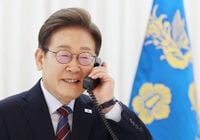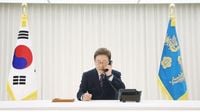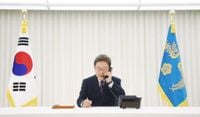President Lee Jae-myung is set to make a significant mark on the international stage as he prepares to attend the upcoming G7 Summit, scheduled from June 15 to June 17, 2025, in Kananaskis, Alberta, Canada. This event will be his first official multilateral diplomatic engagement since taking office, signaling a new chapter in South Korea's foreign relations under his administration.
On June 6, 2025, President Lee conducted a 20-minute phone conversation with former U.S. President Donald Trump from his residence in Hannam-dong, Seoul. This call, notably 10 to 15 minutes longer than typical presidential communications, was characterized by a warm and friendly tone, focusing on building mutual trust and camaraderie rather than diving into substantive policy discussions. The two leaders exchanged congratulations over President Lee's election, with Trump extending an invitation for Lee to visit the United States. Lee welcomed the prospect, emphasizing the importance of frequent consultations as part of the special alliance between the two nations.
During their conversation, the presidents shared anecdotes that revealed personal connections, including a story about receiving red hats emblazoned with "MAGA"—the iconic slogan from Trump's 2016 campaign, standing for "Make America Great Again." They also spoke about their respective political journeys and golf skills, creating a congenial atmosphere that fostered a sense of mutual respect and understanding. A poignant moment arose when both leaders recounted experiences with assassination threats, deepening their sense of shared hardship and solidarity.
Presidential Spokesperson Kang Yu-jung, speaking at a briefing in the Yongsan Presidential Office on June 7, confirmed President Lee's acceptance of the G7 Summit invitation. Kang highlighted that South Korea, while not a G7 member, has been invited as a guest nation by Canada, the chair country for this year's summit. This invitation follows a tradition of G7 chair nations extending participation to select non-member countries to broaden the scope of discussions on pressing global issues.
Kang also announced a restoration of the media quota for the presidential plane to levels seen during the Moon Jae-in administration. This move reverses the significant reductions implemented by the previous Yoon Suk-yeol government, allowing more journalists to accompany the president on official trips, thereby enhancing transparency and media coverage of presidential activities.
The G7, comprising the United States, United Kingdom, Germany, France, Italy, Japan, and Canada, is a key forum for discussing global economic policies, security concerns, and international cooperation. South Korea's participation in this summit represents a strategic opportunity for President Lee to engage directly with world leaders and assert South Korea's role on the global stage. It is anticipated that this summit will also provide a platform for potential trilateral discussions among South Korea, the United States, and Japan, reaffirming the crucial trilateral cooperation that has been a cornerstone of regional diplomacy.
Beyond the summit itself, discussions are underway regarding the possibility of a Korea-U.S. summit in Washington D.C. following the G7 meeting. While details remain confidential, presidential officials have acknowledged the high public interest in such a meeting and confirmed that preparations are actively in progress. Additionally, plans for dispatching a special delegation to the United States are reportedly in motion, though specifics have yet to be disclosed.
President Lee's attendance at the G7 Summit and his burgeoning relationship with President Trump signal a renewed vigor in South Korea's diplomatic efforts, particularly concerning key issues such as customs negotiations and defense cost-sharing arrangements. During their call, both leaders expressed a commitment to advancing the Korea-U.S. alliance and working towards mutually satisfactory agreements on these matters.
Moreover, the Presidential Office is coordinating efforts to arrange phone calls between President Lee and other significant leaders, including Chinese President Xi Jinping and Japanese Prime Minister Ishiba Shigeru, underscoring a comprehensive approach to regional and global diplomacy.
This upcoming summit will not only mark President Lee's debut on the international diplomatic stage but also serves as a barometer for the direction of South Korea's foreign policy. It offers a vital opportunity to strengthen alliances, engage in meaningful dialogue on global challenges, and enhance South Korea's influence within the international community.
As the world watches, President Lee's participation in the G7 Summit could redefine South Korea's diplomatic posture, balancing longstanding partnerships with emerging opportunities to navigate complex geopolitical landscapes. The restoration of media access and the emphasis on open communication further suggest a commitment to transparency and engagement with the public on matters of national and international importance.
With the G7 Summit fast approaching, all eyes will be on President Lee Jae-myung as he steps onto this prominent stage, ready to foster collaboration and chart a course for South Korea's future in the global arena.



